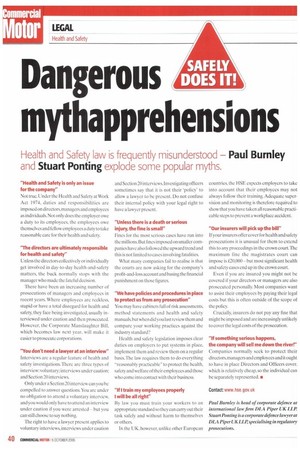Dangerous DOES IT!
Page 40

If you've noticed an error in this article please click here to report it so we can fix it.
SAFELY
mythapprehensions
Health and Safety law is frequently misunderstood — Paul Burnley
and Stuart Ponting explode some popular myths.
"Health and Safety is only an issue for the company" Not true. Under the Health and Safety at Work Act 1974, duties and responsibilities are imposed on directors,managers and employees as individuals. Not only does the employer owe a duty to its employees, the employees owe themselves and fellow employees a duty to take reasonable care for their health and safety.
"The directors are ultimately responsible for health and safety" Unless the directors collectively or individually get involved in day-to-day health-and-safety matters, the buck normally stops with the manager who made the fateful decision.
There have been an increasing number of prosecutions of managers and employees in recent years. Where employees are reckless, stupid or have a total disregard for health and safety, they face being investigated, usually interviewed under caution and then prosecuted. However, the Corporate Manslaughter Bill, which becomes law next year, will make it easier to prosecute corporations, "You don't need a lawyer at an interview" Interviews are a regular feature of health and safety investigations. 'There are three types of interview: voluntary; interviews under caution; and Section 20 interviews.
Only under a Section 20 interview can you be compelled to answer questions. You are under no obligation to attend a voluntary interview, and you would only have to attend an interview under caution if you were arrested — but you can still choose to say nothing.
The right to have a lawyer present applies to voluntary interviews, interviews under caution and Section 20 interviews. Investigating officers sometimes say that it is not their 'policy' to allow a lawyer to be present. Do not confuse their internal policy with your legal right to have a lawyer present.
"Unless there is a death or serious injury, the fine is small" Fines for the most serious cases have run into the millions. But lines imposed on smaller companies have also followed the upward trend and this is not limited to cases involving fatalities.
What many companies fail to realise is that the courts are now asking for the company's profit-and-loss account and basing the financial punishment on those figures.
"We have policies and procedures in place to protect us from any prosecution" You may have cabinets full of risk assessments, method statements and health and safety manuals, but when did you last review them and compare your working practices against the industry standard?
Health and safety legislation imposes clear duties on employers to put systems in place, implement them and review them on a regular basis. The law requires them to do everything "reasonably practicableto protect the health, safety and welfare of their employees and those who come into contact with their business.
if I train my employees properly will be all right" By law you must train your workers to an appropriate standard so they can carry out their task safely and without harm to themselves or others.
In the UK, however, unlike other European countries, the HSE expects employers to take into account that their employees may not always follow their training. Adequate supervision and monitoring is therefore required to show that you have taken all reasonable practicable steps to prevent a workplace accident.
"Our insurers will pick up the bill"
If your insurers offercover finhealth and safety prosecutions it is unusual for them to extend this to any proceedings in the crown court. The maximum fine the magistrates court can impose is £20,000— but most significant health and safety cases end up in the crown court.
Even if you are insured you might not be covered if your directors or managers are also prosecuted personally. Most companies want to assist their employees by paying their legal costs but this is often outside of the scope of the policy.
Crucially, insurers do not pay any fine that might be imposed and are increasingly unlikely to cover the legal costs of the prosecution.
"If something serious happens, the company will sell me down the river!" Companies normally seek to protect their directors, managers and employees and it ought to have in place Directors and Officers cover. which is relatively cheap, so the individual can be separately represented. •
























































































































































































